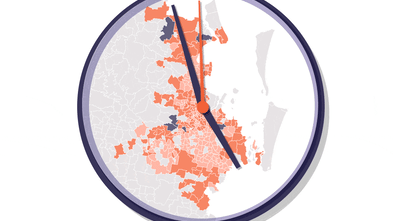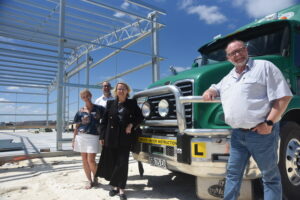
Working hours in Brisbane are significantly longer than in other major Australian cities, as recent data reveals full-time employees in the region average 43 hours and 12 minutes per week. This is roughly 30 minutes more than their counterparts in Sydney and Melbourne, who clock in at approximately 42 hours and 42 minutes and 42 hours and 40 minutes, respectively. The statistics prompt questions about work-life balance in a city often celebrated for its laid-back lifestyle.
Despite the perception of Brisbane as a haven for those seeking a slower pace of life, some areas are home to individuals working particularly long hours. The suburb of Pullenvale, located around 15 kilometers west of Brisbane’s central business district, leads the city with an average of 46 hours and 13 minutes worked each week. This exclusive semi-rural enclave features properties that often exceed $9 million and has attracted affluent residents, including the late motoring magnate Gordon Edward Scifleet and billionaire mining heir Tyson Flannery.
Following Pullenvale, the suburbs of Chandler and Brookfield also rank high, with averages of 45 hours and 29 minutes and 45 hours and 22 minutes, respectively. In contrast, residents of Ellen Grove work the fewest hours, averaging 41 hours and 18 minutes per week.
Mortgage broker Rebecca Le Cornu illustrates the toll of demanding work hours. After enduring 12- to 14-hour days, she eventually sought a better work-life balance by hiring an assistant and parting ways with her business partner. Le Cornu reflects on the lifestyle she envies from her mother, who worked sporadically as a relief teacher and led a more frugal life. “Now, no one is living as frugally. But then, are you happier overall? Is the net result actually better? I’m not so sure,” she said.
While the national standard workweek was reduced from 40 hours to 38 hours in 1983, many Australians feel they are working longer hours. Dr. Tim Ballard from the University of Queensland’s Centre for Business and Organisational Psychology points out that, despite perceptions, the average working hours in Australia are declining. Data from the HILDA survey indicates that the percentage of individuals working extreme hours (50 to 60 hours per week) has decreased from 9.5 percent in 2001 to 5.5 percent today.
Nevertheless, changes in work dynamics are evident. According to research by economist Eliza Littleton, Australians are contributing more unpaid work, averaging four hours and 20 minutes of unpaid overtime weekly, which translates to about six weeks of unpaid overtime annually. For full-time workers, this figure is closer to five hours each week.
Self-employed builder Austin Tarter exemplifies the challenges of maintaining a work-life balance. He frequently exceeds 50 hours of work weekly, starting his day at 6:30 AM and often working into the evenings to handle administrative tasks. “If you’re self-employed, there’s kind of an understanding that that’s how it is … but I do try to keep the weekends sacred,” Tarter noted.
The Organisation for Economic Co-operation and Development (OECD) ranks Australia poorly in terms of work-life balance compared to other Western countries. Dr. Ballard acknowledges that demands on life may contribute to feelings of burnout. Women, in particular, are increasingly working longer hours while still managing domestic responsibilities. He notes that even shared duties come with a significant “communication load,” complicating work-life balance.
Dr. Stacey Parker, an organisational psychologist at the University of Queensland, emphasizes the importance of quality time off. “A vacation once or twice a year doesn’t help protect you from burnout. Disconnecting from work when you’re not clocked on is imperative,” she stated. Research indicates that individuals unable to recuperate over weekends face higher risks of health issues, including cardiovascular disease.
Parker is currently investigating weekend recovery processes and has found that individual needs vary considerably. For working parents, commuting can serve as valuable “me time,” whether for relaxation or exercise. The challenge remains for many to carve out space for self-care amid their busy schedules.
As Brisbane workers navigate the demands of their careers, the balance between professional obligations and personal well-being will continue to be a pressing issue.





